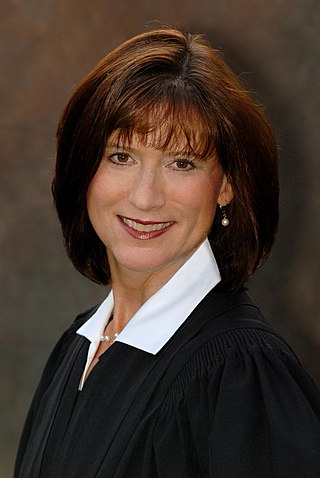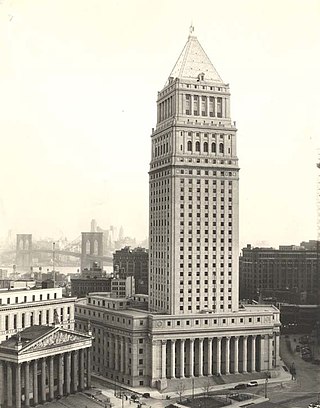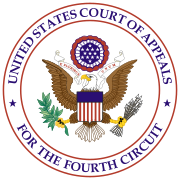
Frank Hoover Easterbrook is an American lawyer and jurist who has served as a United States circuit judge of the U.S. Court of Appeals for the Seventh Circuit since 1985. He was the Seventh Circuit's chief judge from 2006 to 2013.

Smith v. Board of School Commissioners of Mobile County, 827 F.2d 684, was a lawsuit in which the United States Court of Appeals for the Eleventh Circuit held that the Mobile County Public School System could use textbooks which purportedly promoted "secular humanism", characterized by the complainants as a religion.
Church of the Lukumi Babalu Aye, Inc. v. Hialeah, 508 U.S. 520 (1993), was a case in which the Supreme Court of the United States held that an ordinance passed in Hialeah, Florida, forbidding the "unnecessar[y]" killing of "an animal in a public or private ritual or ceremony not for the primary purpose of food consumption", was unconstitutional.
McCreary County v. American Civil Liberties Union of Kentucky, 545 U.S. 844 (2005), was a case argued before the Supreme Court of the United States on March 2, 2005. At issue was whether the Court should continue to inquire into the purpose behind a religious display and whether evaluation of the government's claim of secular purpose for the religious displays may take evolution into account under an Establishment Clause of the First Amendment analysis.

The Religious Land Use and Institutionalized Persons Act (RLUIPA), Pub. L.Tooltip Public Law 106–274 (text)(PDF), codified as 42 U.S.C. § 2000cc et seq., is a United States federal law that prohibits the imposition of burdens on the ability of prisoners to worship as they please and gives churches and other religious institutions a way to avoid zoning law restrictions on their property use. It also defines the term "religious exercise" to include "any exercise of religion, whether or not compelled by, or central to, a system of religious belief." RLUIPA was enacted by the United States Congress in 2000 to correct the problems of the Religious Freedom Restoration Act (RFRA) of 1993. The act was passed in both the House of Representatives and the Senate by unanimous consent in voice votes, meaning that no objection was raised to its passage, so no written vote was taken. The S. 2869 legislation was enacted into law by the 42nd President of the United States Bill Clinton on September 22, 2000.

Diane Schwerm Sykes is an American jurist and lawyer who serves as the chief judge of the U.S. Court of Appeals for the Seventh Circuit. She served as a justice of the Wisconsin Supreme Court from 1999 to 2004.

Glassroth v. Moore, 335 F.3d 1282, and its companion case Maddox and Howard v. Moore, 229 F. Supp. 2d 1290, is a decision from the United States Court of Appeals for the Eleventh Circuit that held a 2+1⁄2 ton granite monument of the Ten Commandments placed in the rotunda of the Heflin-Torbert Judicial Building in Montgomery, Alabama by then-Alabama Supreme Court Chief Justice Roy Moore was a violation of the Establishment Clause of the First Amendment.
Gonzales v. O Centro Espírita Beneficente União do Vegetal, 546 U.S. 418 (2006), was a United States Supreme Court case in which the Court held that, under the Religious Freedom Restoration Act of 1993, the government had failed to show a compelling interest in prosecuting religious adherents for drinking a sacramental tea containing a Schedule I controlled substance. After the federal government seized its sacramental tea, the União do Vegetal (UDV), the New Mexican branch of a Brazilian church that imbibes ayahuasca in its services, sued, claiming the seizure was illegal, and sought to ensure future importation of the tea for religious use. The church won a preliminary injunction from the United States District Court for the District of New Mexico, which was affirmed on appeal.

The Church and School of Wicca was founded by Gavin Frost and Yvonne Frost in 1968. It was the first federally recognized Church of the religion known as Wicca in the United States. It is known for its correspondence courses on the Frosts' unique interpretation of Wicca. The Church and School are located in Beckley, West Virginia.

Thomas Lee Ambro is a Senior United States circuit judge of the United States Court of Appeals for the Third Circuit.
The history of Wicca documents the rise of the Neopagan religion of Wicca and related witchcraft-based Neopagan religions. Wicca originated in the early 20th century, when it developed amongst secretive covens in England who were basing their religious beliefs and practices upon what they read of the historical witch-cult in the works of such writers as Margaret Murray. It also is based on the beliefs from the magic that Gerald Gardner saw when he was in India. It was subsequently founded in the 1950s by Gardner, who claimed to have been initiated into the Craft – as Wicca is often known – by the New Forest coven in 1939. Gardner's form of Wicca, the Gardnerian tradition, was spread by both him and his followers like the High Priestesses Doreen Valiente, Patricia Crowther and Eleanor Bone into other parts of the British Isles, and also into other, predominantly English-speaking, countries across the world. In the 1960s, new figures arose in Britain who popularized their own forms of the religion, including Robert Cochrane, Sybil Leek and Alex Sanders, and organizations began to be formed to propagate it, such as the Witchcraft Research Association. It was during this decade that the faith was transported to the United States, where it was further adapted into new traditions such as Feri, 1734 and Dianic Wicca in the ensuing decades, and where organizations such as the Covenant of the Goddess were formed.
Modern pagans are a religious minority in every country where they exist and have been subject to religious discrimination and/or religious persecution. The largest modern pagans communities are in North America and the United Kingdom, and the issue of discrimination receives most attention in those locations, but there are also reports from other countries.
Inmates incarcerated in the United States penal system practice a variety of religions. Their basic constitutional right to worship has been reinforced by decades of court decisions and more recently by the Religious Land Use and Institutionalized Persons Act. However, several of these court rulings have also set limitations on these rights when prisoner demands are seen to impede prison safety and function.

In United States federal courts, a circuit split, also known as a split of authority or split in authority, occurs when two or more different circuit courts of appeals provide conflicting rulings on the same legal issue. The existence of a circuit split is one of the factors that the Supreme Court of the United States considers when deciding whether to grant review of a case. Some scholars suggest that the Supreme Court is more likely to grant review of a case to resolve a circuit split than for any other reason.
Civil laws regarding kashrut are found in several countries. Advertising standards laws in many jurisdictions prohibit the use of the phrase "kosher" in a product's labelling, unless it can be shown that the product conforms to Jewish dietary laws; however, the legal qualifications for conforming to Jewish dietary laws are often defined differently in different jurisdictions.
The issue of school speech or curricular speech as it relates to the First Amendment to the United States Constitution has been the center of controversy and litigation since the mid-20th century. The First Amendment's guarantee of freedom of speech applies to students in the public schools. In the landmark decision Tinker v. Des Moines Independent Community School District, the U.S. Supreme Court formally recognized that students do not "shed their constitutional rights to freedom of speech or expression at the schoolhouse gate".
Moseley v. V Secret Catalogue, Inc., 537 U.S. 418 (2003), is a decision by the Supreme Court of the United States holding that, under the Federal Trademark Dilution Act, a claim of trademark dilution requires proof of actual dilution, not merely a likelihood of dilution. This decision was later superseded by the Trademark Dilution Revision Act of 2006 (TDRA).
Kimmelman v. Morrison, 477 U.S. 365 (1986), was a decision of the U.S. Supreme Court that clarified the relationship of the right to effective assistance of counsel under the Sixth Amendment to other constitutional rights in criminal procedure. In this case, evidence against the defendant was probably seized illegally, violating the Fourth Amendment, but he lost the chance to argue that point due to his lawyer's ineffectiveness. The prosecution argued that the defendant's attempt to make a Sixth Amendment argument via a habeas corpus petition was really a way to sneak his Fourth Amendment argument in through the back door. The Court unanimously disagreed, and held that the Fourth Amendment issue and the Sixth Amendment issue represented different constitutional values, and had different requirements for prevailing in court, and therefore were to be treated separately by rules of procedure. Therefore, the habeas corpus petition could go forward. In its opinion, the Court also gave guidance on how to apply its decisions in Stone v. Powell and Strickland v. Washington.









